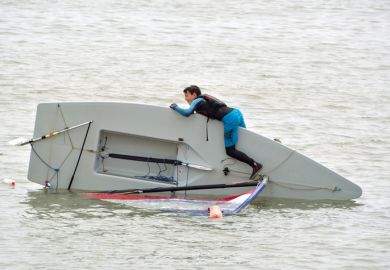It is possible, dear reader, that this very edition of Times Higher Education will be the one that advertises your first full-time lecturing post. If that prospect gives you sweaty palms as well as making your heart leap, you should definitely buy James M. Lang's terrific survival guide: it is like having a cheery, knowledgeable mentor on hand whose occasional descents into mild condescension are more than compensated for by his wisdom.
An English lecturer with extensive background in pedagogical development, Lang's experience as a contributor to The Chronicle of Higher Education, the US equivalent of Times Higher Education, helps to supplement his own perspective with cross-disciplinary advice that will be welcomed by any neophyte teacher.
Few today will be appointed in a coffee bar, as I was, and given no more advice to start with than the students' names and a list of set texts. Even so, this genial induction to professionalism in teaching offers a supplement to institutional provisions that is worthy of the time of even a hard-pressed beginner.
Lang first endears himself with his scepticism about the use of ice-breakers and his qualified enthusiasm for lectures, even if the latter is illustrated with examples from his regular church attendance. In fact, cultural differences seldom intrude beyond references to the baseball hats our students infrequently wear, and the way Americans talk about "going to school"; for the anxious individualism of "tenure review" read our mania for the institutional audits of the research assessment exercise and visits from the Quality Assurance Agency.
The book is very cleverly organised so that you really could read it a week at a time: information unfolds as you might need to know it, just as pedagogical theory is drip-fed informatively but lightly throughout.
Lang shows both why group work seems so often to be fetishised in pedagogical texts and why lecturers (who by definition learn best by reading and writing) are likely to be suspicious of it, and then gives a select range of practical hints to prevent it descending into superficial chit-chat.
There are numerous practical ideas for frazzled new lecturers, yet the whole is suffused with the humane values that ought to inform university teaching, rather than being dominated by educational scholarship.
Lang advises on office politics, student flirtations, problem students and pressures on research, all with a compassionate but firm professionalism. One of the best chapters is on the exhaustion and disillusionment of week 11, and how to get through it. Indeed, the only glaring omission is the swamping tide of emails we all have to cope with every day.
If you are looking for a job, get a headstart by buying and reading this book.
If you already have one, your teaching still stands to gain much from it.
On Course: A Week-by-Week Guide to Your First Semester of College Teaching
By James M. Lang
Harvard University Press
336pp, £17.95
ISBN 9780674028067
Published 22 April 2008
Register to continue
Why register?
- Registration is free and only takes a moment
- Once registered, you can read 3 articles a month
- Sign up for our newsletter
Subscribe
Or subscribe for unlimited access to:
- Unlimited access to news, views, insights & reviews
- Digital editions
- Digital access to THE’s university and college rankings analysis
Already registered or a current subscriber?



